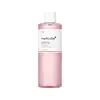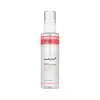What's inside
What's inside
 Key Ingredients
Key Ingredients

 Benefits
Benefits

 Concerns
Concerns

 Ingredients Side-by-side
Ingredients Side-by-side

Water
Skin ConditioningButylene Glycol
HumectantGlycerin
HumectantNiacinamide
Smoothing1,2-Hexanediol
Skin ConditioningXylitol
HumectantSodium Citrate
BufferingEthylhexylglycerin
Skin ConditioningAllantoin
Skin ConditioningCaprylyl Glycol
EmollientCitric Acid
BufferingAdenosine
Skin ConditioningPolyglyceryl-10 Laurate
Skin ConditioningDisodium EDTA
Polyglyceryl-4 Laurate
EmulsifyingCaprylyl/Capryl Glucoside
CleansingCyanocobalamin
Skin ConditioningRosa Damascena Extract
MaskingSodium Dna
Skin ConditioningGluconolactone
Skin ConditioningPrunus Mume Fruit Extract
HumectantPyrus Malus Fruit Extract
Skin ConditioningCarica Papaya Fruit Extract
Skin ConditioningVitis Vinifera Fruit Extract
Skin ConditioningCentella Asiatica Leaf Extract
Skin ConditioningCentella Asiatica Extract
CleansingSodium Hyaluronate
HumectantZea Mays Leaf Extract
Skin ConditioningCopper Tripeptide-1
Skin ConditioningAcetyl Hexapeptide-8
HumectantPalmitoyl Pentapeptide-4
Skin ConditioningPalmitoyl Tetrapeptide-7
Skin ConditioningPalmitoyl Tripeptide-1
Skin ConditioningGlycine
BufferingGlutamic Acid
HumectantArginine
MaskingWater, Butylene Glycol, Glycerin, Niacinamide, 1,2-Hexanediol, Xylitol, Sodium Citrate, Ethylhexylglycerin, Allantoin, Caprylyl Glycol, Citric Acid, Adenosine, Polyglyceryl-10 Laurate, Disodium EDTA, Polyglyceryl-4 Laurate, Caprylyl/Capryl Glucoside, Cyanocobalamin, Rosa Damascena Extract, Sodium Dna, Gluconolactone, Prunus Mume Fruit Extract, Pyrus Malus Fruit Extract, Carica Papaya Fruit Extract, Vitis Vinifera Fruit Extract, Centella Asiatica Leaf Extract, Centella Asiatica Extract, Sodium Hyaluronate, Zea Mays Leaf Extract, Copper Tripeptide-1, Acetyl Hexapeptide-8, Palmitoyl Pentapeptide-4, Palmitoyl Tetrapeptide-7, Palmitoyl Tripeptide-1, Glycine, Glutamic Acid, Arginine
Water
Skin ConditioningCollagen Water
HumectantDipropylene Glycol
HumectantC13-15 Alkane
SolventRicinus Communis Seed Oil
MaskingGlycereth-26
Humectant1,2-Hexanediol
Skin ConditioningNiacinamide
SmoothingSodium Chloride
MaskingSorbitol
HumectantHydroxyethyl Urea
HumectantButylene Glycol
HumectantHelianthus Annuus Seed Oil
EmollientParfum
MaskingEthylhexylglycerin
Skin ConditioningEclipta Prostrata Extract
Skin ConditioningAdenosine
Skin ConditioningSodium Dna
Skin ConditioningMelia Azadirachta Leaf Extract
Skin ConditioningGlutathione
Paeonia Lactiflora Root Extract
Skin ConditioningMoringa Oleifera Seed Oil
EmollientCandida Bombicola/Glucose/Methyl Rapeseedate Ferment
AntimicrobialRosa Damascena Flower Water
MaskingBiotin
AntiseborrhoeicHexapeptide-2
BleachingBiotinoyl Tripeptide-1
Acetyl Hexapeptide-8
HumectantTripeptide-1
Skin ConditioningTripeptide-3
Skin ConditioningMyristoyl Pentapeptide-17
Skin ConditioningHexapeptide-9
Skin ConditioningWater, Collagen Water, Dipropylene Glycol, C13-15 Alkane, Ricinus Communis Seed Oil, Glycereth-26, 1,2-Hexanediol, Niacinamide, Sodium Chloride, Sorbitol, Hydroxyethyl Urea, Butylene Glycol, Helianthus Annuus Seed Oil, Parfum, Ethylhexylglycerin, Eclipta Prostrata Extract, Adenosine, Sodium Dna, Melia Azadirachta Leaf Extract, Glutathione, Paeonia Lactiflora Root Extract, Moringa Oleifera Seed Oil, Candida Bombicola/Glucose/Methyl Rapeseedate Ferment, Rosa Damascena Flower Water, Biotin, Hexapeptide-2, Biotinoyl Tripeptide-1, Acetyl Hexapeptide-8, Tripeptide-1, Tripeptide-3, Myristoyl Pentapeptide-17, Hexapeptide-9
 Reviews
Reviews

Ingredients Explained
These ingredients are found in both products.
Ingredients higher up in an ingredient list are typically present in a larger amount.
1,2-Hexanediol is a synthetic liquid and another multi-functional powerhouse.
It is a:
- Humectant, drawing moisture into the skin
- Emollient, helping to soften skin
- Solvent, dispersing and stabilizing formulas
- Preservative booster, enhancing the antimicrobial activity of other preservatives
Acetyl Hexapeptide-8, commonly known as Argireline or Acetyl Hexapeptide-3, is a popular peptide in skincare. It’s often referred to as a “Botox-like” ingredient because it helps reduce muscle movement.
By relaxing these micro-movements, Argireline may help minimize the appearance of fine lines and wrinkles. That said, it’s not as powerful as Botox, and research on its long-term effectiveness is still limited.
Beyond smoothing, Argireline may also support collagen production. Collagen is the protein that helps keep your skin firm, bouncy, and well-hydrated by strengthening the skin barrier.
So while Argireline isn’t a miracle fix, it can be a helpful addition to a routine focused on both prevention and skin health.
Read more about other common types of peptides here:
Learn more about Acetyl Hexapeptide-8Adenosine is in every living organism. It is one of four components in nucleic acids that helps store our DNA.
Adenosine has many benefits when used. These benefits include hydrating the skin, smoothing skin, and reducing wrinkles. Once applied, adenosine increases collagen production. It also helps with improving firmness and tissue repair.
Studies have found adenosine may also help with wound healing.
In skincare products, Adenosine is usually derived from yeast.
Learn more about AdenosineButylene Glycol (or BG) is used within cosmetic products for a few different reasons:
Overall, Butylene Glycol is a safe and well-rounded ingredient that works well with other ingredients.
Though this ingredient works well with most skin types, some people with sensitive skin may experience a reaction such as allergic rashes, closed comedones, or itchiness.
Learn more about Butylene GlycolEthylhexylglycerin (we can't pronounce this either) is commonly used as a preservative and skin softener. It is derived from glyceryl.
You might see Ethylhexylglycerin often paired with other preservatives such as phenoxyethanol. Ethylhexylglycerin has been found to increase the effectiveness of these other preservatives.
Niacinamide is a multitasking form of vitamin B3 that strengthens the skin barrier, reduces pores and dark spots, regulates oil, and improves signs of aging.
And the best part? It's gentle and well-tolerated by most skin types, including sensitive and reactive skin.
You might have heard of "niacin flush", or the reddening of skin that causes itchiness. Niacinamide has not been found to cause this.
In very rare cases, some individuals may not be able to tolerate niacinamide at all or experience an allergic reaction to it.
If you are experiencing flaking, irritation, and dryness with this ingredient, be sure to double check all your products as this ingredient can be found in all categories of skincare.
When incorporating niacinamide into your routine, look out for concentration amounts. Typically, 5% niacinamide provides benefits such as fading dark spots. However, if you have sensitive skin, it is better to begin with a smaller concentration.
When you apply niacinamide to your skin, your body converts it into nicotinamide adenine dinucleotide (NAD). NAD is an essential coenzyme that is already found in your cells as "fuel" and powers countless biological processes.
In your skin, NAD helps repair cell damage, produce new healthy cells, support collagen production, strengthen the skin barrier, and fight environmental stressors (like UV and pollution).
Our natural NAD levels start to decline with age, leading to slower skin repair, visible aging, and a weaker skin barrier. By providing your skin niacinamide, you're recharging your skin's NAD levels. This leads to stronger, healthier, and younger looking skin.
Another name for vitamin B3 is nicotinamide. This vitamin is water-soluble and our bodies don't store it. We obtain Vitamin B3 from either food or skincare. Meat, fish, wheat, yeast, and leafy greens contain vitamin B3.
The type of niacinamide used in skincare is synthetically created.
Learn more about NiacinamideSodium DNA is an emerging anti-aging ingredient.
It is created by taking deoxyribonucleic acid (DNA) and purifying it with sodium hydroxide.
The DNA is extracted from several different animal sources, including: calf thymus, the gonadic tissue of a male sturgeon, or herring / salmon sperm.
You have probably seen this ingredient in anti-aging skincare. But what is it?
DNA is composed of nucleotides, or chemical building blocks. Nucleotides include adenine (A), thymine (T), guanine (G), and cytosine (C). Talk about a flashback to biology! Nucleosides are formed from these nucleotides.
The science behind Sodium DNA is based on an ingredient called Polydeoxyribonucleotide or PDRN.
PDRN are DNA fragments mainly extracted from the sperm cells of trout or salmon. Meaning, PDRN can be derived from Sodium DNA.
PDRN consists of chains of nucleotides and nucleosides mentioned above. They can range anywhere from 80 - 2000 pairs.
Studies show PDRN has the following properties:
Most of the research on PDRN has been done using injectable forms. That’s important, because PDRN is a large molecule and doesn’t absorb well through the skin. So if you’re applying it topically, the effects are likely to be much milder.
Still, topical Sodium DNA is emerging as a trendy anti-aging ingredient. It’s generally well-tolerated and offers good biocompatibility with human skin, making it a low-risk addition to most routines.
Further studies are needed to truly confirm this ingredients anti-aging ability (Remember, retinol has decades of research!).
When using this ingredient, is is best to ask a brand about the source of their Sodium DNA. You'll want to find products where the Sodium DNA is sourced from fish. Some Sodium DNA is derived from calf / cow thymus.
Needless to say, this ingredient is not vegan.
Learn more about Sodium DnaWater. It's the most common cosmetic ingredient of all. You'll usually see it at the top of ingredient lists, meaning that it makes up the largest part of the product.
So why is it so popular? Water most often acts as a solvent - this means that it helps dissolve other ingredients into the formulation.
You'll also recognize water as that liquid we all need to stay alive. If you see this, drink a glass of water. Stay hydrated!
Learn more about Water